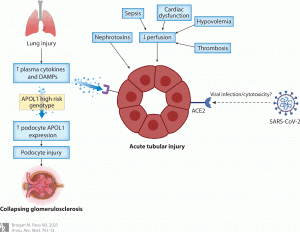The COVID-19 pandemic has reshaped our understanding of many health conditions, particularly the interplay between viral infections and chronic diseases. One area of growing concern is the impact of COVID-19 on kidney disease, a topic that has garnered significant attention in recent medical literature. The kidneys, vital organs responsible for filtering blood and maintaining overall homeostasis, have emerged as both targets and casualties of the SARS-CoV-2 virus, leading to complex challenges in managing patients with COVID-19, especially those with pre-existing kidney conditions.
COVID-19 and Acute Kidney Injury (AKI)
Acute Kidney Injury (AKI) is one of the most common and severe complications associated with COVID-19. The pathogenesis of AKI in COVID-19 patients is multifactorial, involving direct viral invasion, immune-mediated damage, and hemodynamic alterations. The virus can infect kidney cells, primarily through the angiotensin-converting enzyme 2 (ACE2) receptors, which are abundantly expressed in renal tissue. However, the presence of viral RNA in kidney cells remains controversial, with some studies suggesting that viral particles detected in the kidneys may be artifacts or misidentified cellular components.
Patients with severe COVID-19 often present with a combination of factors that predispose them to AKI, including systemic inflammation, cytokine storms, and microvascular injury. The inflammatory response triggered by SARS-CoV-2 can lead to widespread endothelial damage, contributing to thrombosis and impaired kidney perfusion. Furthermore, the use of nephrotoxic drugs and mechanical ventilation in critically ill patients exacerbates the risk of AKI, making its management particularly challenging.

Figure 1: Schematic representation of the major factors contributing to acute kidney injury and collapsing glomerulosclerosis in patients with COVID-19. Abbreviation: DAMPs, damage-associated molecular patterns. Figure adapted from images created with BioRender.com.
Chronic Kidney Disease (CKD) and COVID-19
Chronic Kidney Disease (CKD) patients represent a high-risk group for severe COVID-19 outcomes. The immune dysregulation observed in CKD, characterized by impaired immune responses and chronic inflammation, predisposes these patients to more severe disease manifestations and higher mortality rates. The pandemic has highlighted the vulnerability of this population, with many CKD patients experiencing exacerbated kidney function decline following COVID-19 infection.
Moreover, COVID-19 has been linked to the development of new-onset CKD in previously healthy individuals, particularly those who suffered from severe AKI during their illness. The long-term renal consequences of COVID-19 are still being unravelled, but evidence suggests that survivors of severe COVID-19, especially those with AKI, are at increased risk of progressing to CKD or even end-stage kidney disease (ESKD).
COVID-19-Associated Glomerular Diseases
The impact of COVID-19 extends to the glomeruli, the kidney’s filtration units, leading to various glomerular diseases. These conditions, such as focal segmental glomerulosclerosis (FSGS) and minimal change disease (MCD), are often characterized by proteinuria and can lead to significant kidney damage if not promptly managed. The term “COVID-19-associated nephropathy” (COVAN) has been coined to describe these conditions, particularly in patients of African descent, who appear to be more susceptible due to genetic predispositions, such as the APOL1 high-risk genotype.
These glomerular diseases may be triggered by direct viral infection of podocytes, the specialized cells in the glomeruli, or by the intense immune response elicited by the virus. The exact mechanisms remain under investigation, but the correlation between severe COVID-19 and the development of glomerular diseases is becoming increasingly clear.
Management of Kidney Disease in COVID-19 Patients
Managing kidney disease in the context of COVID-19 requires a nuanced approach, balancing the need to treat the viral infection while minimizing further kidney damage. Patients with severe kidney disease, particularly those on dialysis or who have undergone kidney transplantation, face unique challenges. These patients are at heightened risk of severe COVID-19 due to their compromised immune systems, and their treatment regimens must be carefully adjusted to avoid drug toxicity while maintaining effective immunosuppression.
Vaccination has proven to be a crucial tool in protecting this vulnerable population, but vaccine response in kidney patients, especially those on immunosuppressive therapy, is often suboptimal. This necessitates continued vigilance and possibly booster doses to ensure adequate protection.
Conclusion
COVID-19 has underscored the intricate relationship between infectious diseases and chronic conditions like kidney disease. The pandemic has brought to light the critical need for tailored approaches in managing kidney disease amidst the challenges posed by COVID-19. As research continues to evolve, it will be essential to refine treatment protocols and preventive strategies to mitigate the impact of COVID-19 on patients with kidney disease.
Journal article: Brogan, M. et al. 2023. COVID-19 and Kidney Disease. Annual Review of Medicine.
Summary by Faith Oluwamakinde










